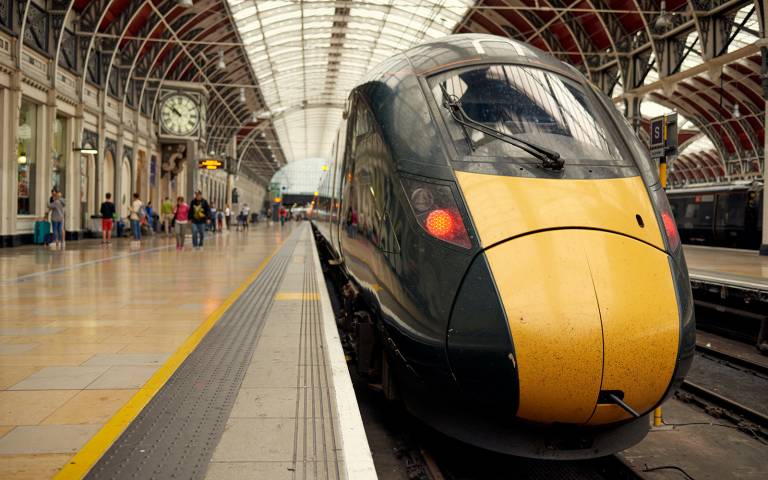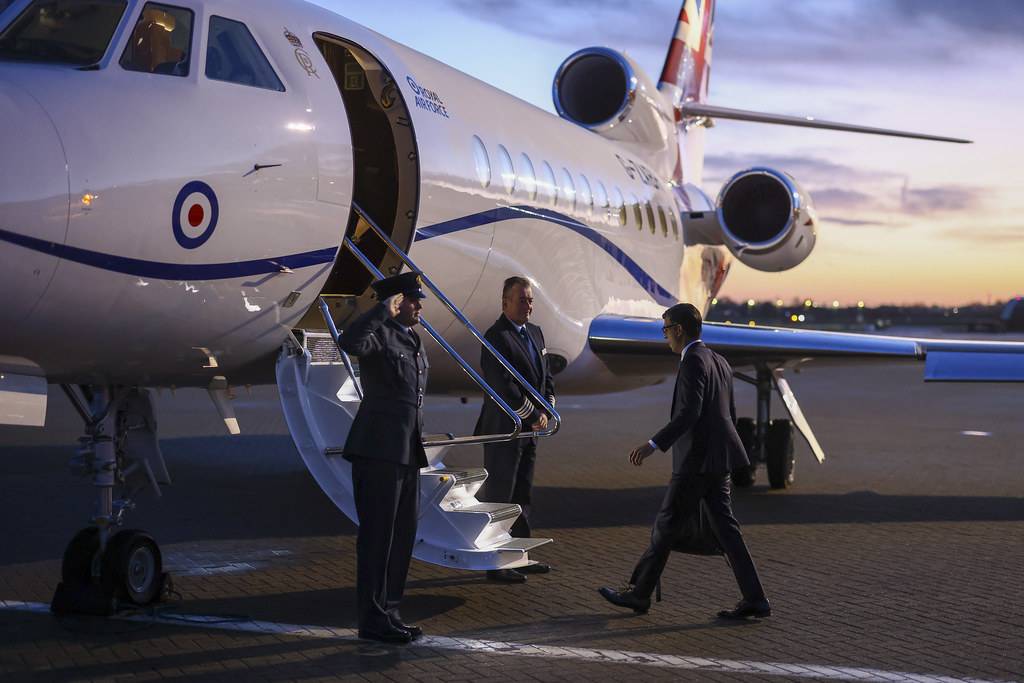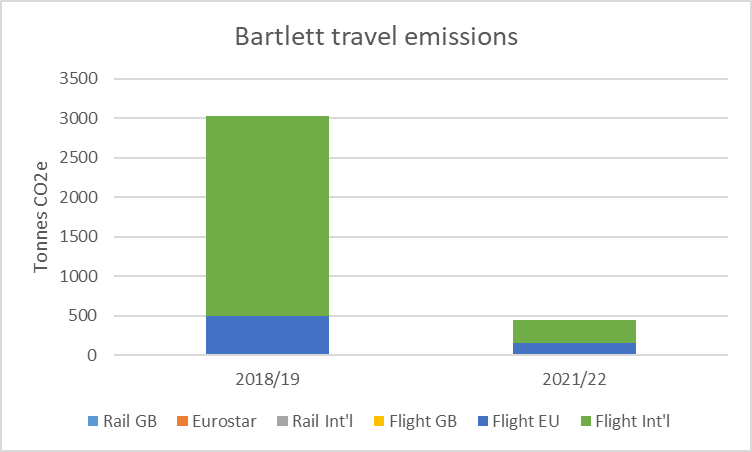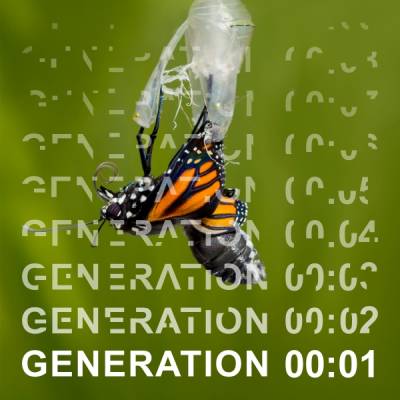Plane simple? The contradictions and contortions of travel and net zero
24 March 2023
Travel is central to many research, teaching and knowledge exchange activities at The Bartlett, but can be costly in terms of CO2e emissions. How can we reconcile these conflicting pressures, asks Nick Hughes, Bartlett Faculty Lead for Climate Action?

By Nick Hughes, Bartlett Faculty Lead for Climate Action
In January 2023, UK Prime Minister Rishi Sunak was criticised by Green, Labour and SNP MPs for “utterly indefensible” shows of “extravagance”, which made “a mockery of his climate pledges”. The PM’s misdemeanours? Using private jets and helicopters to fly short distances for photo-calls and other engagements within the UK, including a 200-mile trip between London and Leeds.
In late October 2022, Prime Minister Sunak was condemned by Labour leader Keir Starmer for a “failure of leadership” for his decision not to attend COP 27 in Egypt. Within a few days, with international criticism also mounting, Mr Sunak had reversed his decision, and flew into the conference the following week.

Depending on the context, political leaders can be condemned for taking a plane, and condemned for not taking a plane. A frivolous indulgence in high carbon transport is increasingly a target for criticism, being seen as indicative of hypocrisy and a lack of seriousness about climate commitments. And yet there are still some flights that we expect our leaders to take – including those that if not taken will lead to similar criticisms of ineffectual climate leadership.
Academics and travel
What about universities? Will the perceived extravagance of the jet-setting academic also be subject to increasing scrutiny and accusations of hypocrisy?
In the Bartlett, we travel for a number of purposes, including research, teaching and knowledge exchange, that are intertwined with the work we do. The importance of travel to our work has to be taken seriously.
At the same time, the Bartlett has adopted a target of net-zero emissions from our faculty operations by 2030, in line with the equivalent UCL-wide pledge. This too is a commitment which has to be taken seriously.
In this blog I want to reflect on the challenges of balancing these two priorities, in order to set the scene for a faculty-wide discussion over the next few weeks on how the faculty can come to a position on travel that is fair, respectful of the important research and teaching we do, and also consistent with our ambitious pledge to reach net-zero emissions by 2030.
In this blog, and in the forthcoming discussions, I am referring to emissions from travel that directly arise from research and teaching activities carried out from the Bartlett and as part of Bartlett courses. I am not at this point examining the emissions created by people travelling from their home country to the UK in order to take up a job or a course of study at the Bartlett. We will consider this topic in due course, but it needs its own dedicated and sensitive discussion.
Net-zero means that any travel emissions that are still created in 2030 will need to be 'offset'. Offsetting is a complex and controversial topic, which will itself require careful consideration. Suffice to say though, that in line with the three guiding principles of our net-zero agenda, offsetting is not a first, but a last resort. In travel, as with all other sectors, we must do everything we can to reduce our emissions to the lowest possible level, before resorting to offsets – rather than using a poorly thought-through offsets approach as an excuse to take no other actions.
Where are we now? UCL and Bartlett travel emissions
In 2018/19, the last full academic year before the pandemic, UCL’s work-related travel created about 35,000 tonnes of CO2-equivalent (CO2e), accounting for about 11% of the university’s total greenhouse gas emissions, according to HESA.
Data provided by Sustainable UCL suggests that the Bartlett’s travel emissions in that year amounted to 3,031 tonnes CO2e. Breaking down this total by mode of transport suggests that flights are overwhelmingly the main contributor. As shown in the figure below, flights to EU destinations represented about 16% of our total travel emissions, with flights to other international destinations accounting for 84%, and rail and other modes having a negligible impact. The figure also shows the data for 2021/22, when the impact of restricted travel in the aftermath of Covid lockdowns was still very evident in the dramatically reduced emissions from travel compared to the earlier year.

The much lower emissions in 2021/22 are primarily due to the lingering effects of the later lockdown periods, from which we have now emerged. If we remain free of Covid-restrictions over the coming years, our travel emissions may well be expected to return to, and overtake, 2018/19 levels. What can we do to cut into these emissions, even as our freedom to travel returns?
Do we need to travel?
Perhaps the first question we should ask when planning work-related travel is: do we in fact need to travel at all? The proliferation of online meeting culture during the pandemic was primarily a necessary response to a grave situation. Online meetings are not the same as meeting in person, and as the pandemic receded there was considerable relief in having the option to see people in person again.
But one outcome of being forced into online communications was the perhaps unexpected discovery that many kinds of meetings do work well online. Huge numbers of round-table meetings, presentations, seminars, even entire conferences, were carried out online during the pandemic. Some would argue that such meetings incur no loss of efficacy in the virtual space; whereas the gains of the reduced travel time and cost are self-evident.
Online platforms can enable partners in different countries to have briefer but much more regular meetings – arguably helping them to stay in touch better than the traditional option of an intense but occasional multi-day summit. I was involved in a collaborative project with partners in Ghana and Zambia that ran throughout the lockdown period. Our short but regular fortnightly online calls helped to foster extremely close working relationships between all project partners.
Bearing all this in mind then, it is legitimate to ask ourselves – do we need to travel? Is there something about the objectives we need to meet that requires us to be in a certain place in person? Or could our objectives be met just as well – and even with some additional benefits – through online communications?
How far do we need to travel?
If we need to travel in order to have certain experiences on location, it may also be appropriate to ask how far we need to go to have those experiences. If one is undertaking fieldwork for a project that is conducting research about a particular place, clearly the fieldwork needs to be carried out in that place – there is no point trying to carry out ethnographic research about an informal settlement in Nairobi by taking a train to Nuneaton. If, however, one is organising a fieldtrip with certain learning objectives, and there are in fact several locations in the world that would meet those objectives equally well, then there may be an opportunity to improve the carbon footprint of the trip by choosing the location that is closest, or is accessible by rail, road or ferry.
Essential in-person multi-partner project meetings could also be convened in equidistant locations that minimise transport for all; or hubs could be used for multiple sets of partners to convene in person, with the hubs then connecting virtually as necessary.
Can we change the way we travel?
As described in my last blog, choosing rail, ferry or coach above air or private car, will reliably achieve substantial emissions savings per journey. Most of us are not following our Prime Minister’s example and taking private jets and helicopters for short journeys within the UK. But we may still be taking short haul flights to some destinations that are almost as conveniently accessed by rail. And perhaps my colleague James Price’s rail-based travel choices for more distant destinations may increasingly become the norm, with appropriate support from the university, faculty, or with appropriate planning within projects, to help researchers account for issues of cost and time.
Can we make our travel miles count for more?
Travel miles are multiplied if we make several short single purpose trips. Conversely, we can attenuate our travel footprint if we can make one trip serve multiple purposes. This may seem challenging at first – requirements to travel often simply present themselves at certain times without much flexibility. However, perhaps with a little more detailed and integrated planning of our work-related travel, within and between projects, we may be increasingly able to substitute several flying visits for a smaller number of more in-depth and purposeful engagements.
Can we address our travel emissions in a fair way?
All of the above measures can and should prioritise fairness. This could for example involve paying attention to the different needs to travel that less senior people may have relative to more senior people, due to the potentially significant impact the travel could have at a critical point in their career. For those of us engaged in projects with Global South partners, it may be legitimate to ask whether travel miles spent in the service of collaboration and capacity building, may be more fairly spent by paying for our partners to visit us here, rather than for us to travel to them.
Next steps
These are simply starting thoughts in what I hope will be a longer conversation.
If you’re a member of the Bartlett, I would love to hear your views. Please:
- Write your thoughts here
- Sign up here to take part in an in-person discussion later in the summer term of 2023
These forms will remain open until Friday 21 April 2023.
I look forward to reporting back on our discussions later in the year.
Lead image credit: JJ Jordan for Unsplash
 Close
Close


